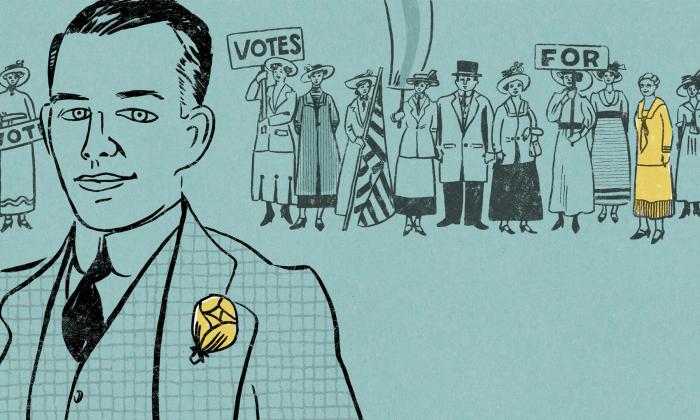
Aug. 18, 1920: Harry Burn fidgeted in his seat in the Tennessee House of Representatives. He touched the red rose on his lapel. Wearing that rose showed that he was against giving women the right to vote. Supporters of women’s voting rights—or suffrage—wore yellow roses. In Tennessee, the struggle for women’s suffrage became known as the war of the roses.
Burn reached inside his jacket and touched the letter he had just received from his mother urging her son to “be a good boy” and “vote for suffrage.” What should he do?
Many states had already passed the 19th Amendment to the U.S. Constitution, giving women across the country the right to vote. Only one more state was needed to ratify the amendment. Tennessee became the final battleground.
The Tennessee Senate quickly approved the 19th Amendment, and it was up to the House to vote yes or no. No one knew what would happen: 48 members of the House were for the amendment and 48 were opposed. A tie vote was a no. People from across the nation—both for and against women’s suffrage—filled the room. They waited silently as each representative called out his vote.
Sweat poured down Burn’s face. At age 24, he was the state’s youngest representative. Yet soon his vote might affect the entire nation.
Thoughts raced through his head: Many people don’t think women should vote, but women work as hard as men. Why shouldn’t they have the same rights? My mother knows more about politics than most men. She should be allowed to vote. I know I should support women’s suffrage. But what will other people think?
Burn’s name was called. The moment had come. Burn paused for just an instant. His mother’s words ran through his mind: “Be a good boy; vote for suffrage.” Burn raised his hand. “Yea,” he said. The amendment now had enough votes to pass. Women had won the right to vote!
Supporters cheered. Opponents of women’s suffrage were angry. Why had Burn changed his vote? Afraid, Burn ran from the room. He thought the angry anti-suffragists might hurt him. He climbed up into the attic of the state Capitol and waited for people to calm down.
The next day, Burn addressed the legislature. He calmly defended his decision to change his vote. He said it was his chance “to free 17 million women from political slavery” and that “a mother’s advice is always safest for a boy to follow.” He will always be known as the person who cast the deciding vote for women’s suffrage.
Questions for Readers
Right There: Create a chart showing the who, what, when, where, why and how of the story.
On My Own: In 1920, people wore roses to express their opinion of women’s suffrage. What are some symbols people use to express their political and social views today?
Author and You: List three forces that weighed on Harry Burn’s decision. Of those, which do you think was his greatest duty, and did he fulfill it?
Think and Search: Compare how Burn is described in the beginning and end of the story. What changed?
